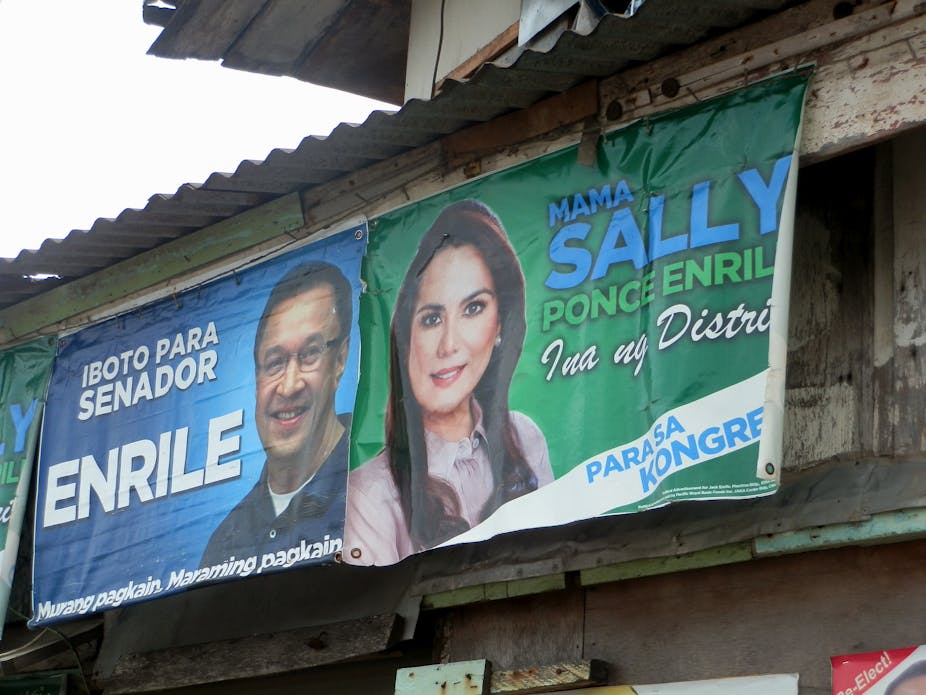For the average person schooled the the Western sense of an election, democracy in action in other parts of the world can be challenging, if not confronting.
Driving into the town, past the carabaos cooling themselves in the flooded paddy fields, our local guide received an anonymous text. “You can go in, but you may not come out”.
We were as far north as you can go, at the tip of the Philippines archipelago where the Pacific Ocean meets the South China Sea, volunteering as foreign election observers in last month’s general midterm elections.
Aside from some nagging issues like crowded classrooms and minimal secrecy, a few faulty optical scanning machines and some technical problems in the transmission of results, these elections had seemed relatively smooth. The new electronic voting system has made wholesale cheating (especially tampering with ballots) more difficult. Turn out among the Philippines’ 52 million voters was around 75% and at national level saw a loose pro-government alliance win enough seats to continue dominating both houses.
The qualitative story is never so simple. Up in the north, as in other parts of the country, the buying of local votes had begun a month earlier, and the payment of clan bosses by national politicians had started well before that. Even the “reformist” candidate running for governor admitted most politicians had private armies. It was widely known the ex-police general now running for mayor was enjoying the helpful support of his former men.
And when we asked the police commander why the area was outwardly more peaceful than in 2010 (when a number of political candidates were murdered), he explained it was his mobile squads were telling the people they would be killed if they caused “trouble”.

It wasn’t my first time in the thick of a Philippines election. I was a foreign observer during the 2010 presidential vote in a small hacienda town on the island of Negros.
Election monitoring by independent observers has become an important source of data for political scientists eager to measure, compare and explain “electoral integrity” across countries and regime types. If we can develop a universal causal theorem about why elections succeed or fail, we’ll be better informed to intervene with technical assistance and mitigate the problems, especially in developing countries and new democracies.
The trouble is, when the formal process of an election becomes abstracted from the local context, our explanations of why things go wrong will not only be radically incomplete, but risk proving misleading or fairly meaningless to the population in question.
Philippines’ elections are always loud and colourful. They’re also perplexing. We couldn’t hope to understand the antics that go on without a good knowledge of the background story. After all, democracy grows out of a nation’s history and experience. It can’t simply be exported or implanted. But that’s exactly what happened.
The Philippines’ first independence of 1899, which followed three and a half centuries of Spanish colonial rule, was brutally cut short when US military took the islands by force in 1901. The new administrators, in the first of many colonial paradoxes, set about teaching Filipinos about freedom and democracy. To ensure the project’s success and fend off the threat of revolution, the Americans limited the electorate to a small Filipino elite. Anyone found advocating independence was punished by death.
Over the next 40 years of US rule, the proliferation of electoral offices from local to national level, in the absence of anything resembling a national bureaucracy, turned a scattered and unorganised landowner class into an impenetrable ruling oligarchy. The new Filipino politicians came to love this American democracy. After all, it meant they enjoyed (and still largely do) personal control over the policing and public administration.
Even Cory Aquino, swept into power by a surge of popular support following the 1986 People Power Revolution supported by a multi-class alliance rallying under the unifying banner of “democracy”, restored the machinery of elections without any genuine democratisation of political life.
After more than 100 years, elections in the Philippines do strikingly little to give the “demos” a voice, while continuing to be milked for private gain.

There’s a certain disbelief when we read that results of last month’s elections see political dynasties more entrenched than ever. Perhaps the stand out is Imelda Marcos, eccentric widow of the late dictator, who at 83 years old was elected as congressional representative. She’s joined by daughter Imee, who won as governor, and son Bong who is already there. The list of famous political families and clans to win office, many convicted criminals and known grafters, goes on and on.
To the vast majority of Filipino voters today, who range from low-income workers to the unimaginably poor, the only palpable dimension of “government” they have ever known is the periodic dispensing of favours by local bosses and politicians. It makes sense to vote for political families and clans who represent personal connection in a system run on nepotism and pork barrel-politics. It’s irrelevant whether they’re crooks or related to deposed despots.
It’s not uncommon to hear the sentiment today, even from young people, that dictatorship was better than this. At least under Marcos there was order and discipline. Other young people I talked with were considering not participating at all. It’s patronising, being told their vote is important when they know all elections do is prop up a mega-rich elite.
In Asia’s oldest democracy, these ailments are not evidence for ceasing elections or turning to authoritarian rule.
But they do need to be taken into account when we consider the way in which democracies and elections evolve.

